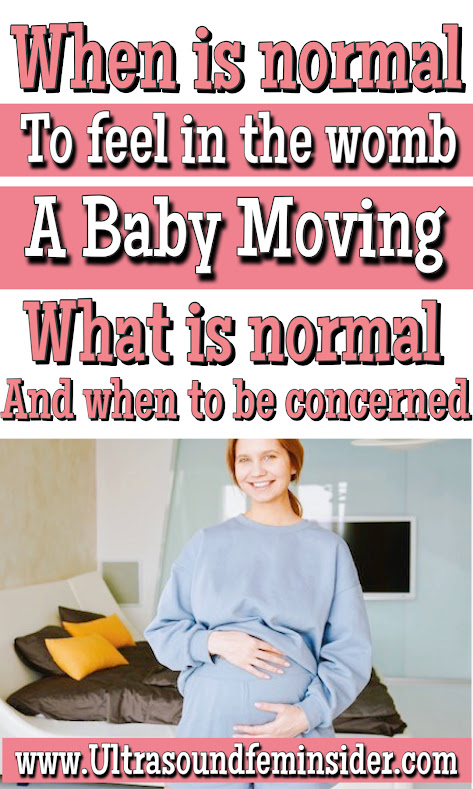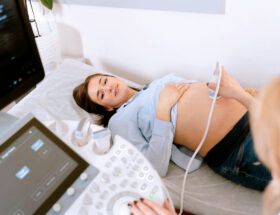During pregnancy, one of the most wonderful sensations is experiencing the movements of your unborn child. The term “quickening” refers to the movements of a baby. Quickening in pregnancy truly refers to all different sorts of baby movements including flutters, punches, stretches, rolls and kicks. You are undoubtedly excited to feel some kicks and punches now that you are pregnant because this is such an exciting moment for you, but do you know when you really start to feel a baby Moving? that’s what we are talking about in this article. Ready? Let’s begin.
When do You Really Start to Feel a Baby Moving? Everything you Need to Know About Fetal Quickening!
First let’s take a look at What Does Quickening Feel Like?
There are a lot of different cool and interesting ways to express what it’s like to feel your baby’s first movements. One comparison that comes to me is the soft fluttering of wings on a butterfly. In most cases, it is difficult to detect, but once you do, you will appreciate the pleasant sweetness it provides.
As your pregnancy continues, those subtle movements will develop into more pronounced kicks, jabs, and even flips as your baby moves inside of the uterus. Naturally, as the weeks and months pass and the baby takes up more space, the movements may seem more intense. This is because there is less area for the baby to move around. Movements may even be felt closer to the cervix and even further down the abdomen during the third trimester. Some women report feeling like a shooting sensation in the vagina when there is direct contact with the cervix.
Related article: Everything You Want to Know About the Biophysical Profile.
When do You Really Start to Feel a Baby Moving?
It is impossible to generalize because each pregnancy is unique, yet there are some standards that are fairly consistent across the board. The majority of women who are pregnant for the first time will start to feel baby movements between the 18th and 20th week of their pregnancy. It is possible that it will take even longer than 20 weeks for you to start feeling movement, mainly if you are pregnant for the first time, but by the time you are 24 weeks pregnant, you should definitely start experiencing baby quickening on a daily basis.
What Determines When and How you Start Feeling the Baby Moving?
The three major factors that can influence how soon you’ll feel the baby move or the intensity of those movements are:
- Placenta location.
- Amount of amniotic fluid.
- Fetal position.
There are a few different things that can influence the way you feel during those early baby movements. Out of the three factors mentioned above the most common is the Placenta location. It’s possible that the quality and intensity of the feelings you feel during pregnancy are directly related to the position of the placenta, the organ that provides support to the developing baby. When a placenta is located anteriorly, it indicates that the organ is attached to the front or anterior section of the uterine wall. As a result of this, it serves the purpose of a sort of pillow for the kicking fetus. Because of this, it’s possible that the placenta absorbs some of the impact of the kicks, making them less noticeable. Women who have an anterior placenta typically experience less movement on the front side of the belly and generally may report greater sensation on the sides, particularly in the first months of pregnancy. This is because the placenta is located on the front of the uterus. As a general rule, the kicks and rolls of the fetus become more powerful and the movement becomes more obvious as the fetus becomes larger.
Related article: Kick Counts During Pregnancy. How to do it and Why is Important.
You can share this article by clicking the image below.

First pregnancy vs Second Pregnancy? When can you feel baby move in a second pregnancy?
When it comes to feeling the baby moves, in addition to the placental location, another important consideration is whether or not this is the woman’s first pregnancy. Movements may be felt earlier for mothers who are having their second or third pregnancy, often between 14 and 16 weeks of gestation. In a nutshell, these mothers have an idea of what to anticipate and are able to detect more delicate flutters. Mothers who have already given birth to one or more children, have a greater ability to notice the motions and differentiate them from the movements caused by gases for example in their digestive systems.
When Do You Feel Baby Move Most During the Day?
Evening is the time of day when you are most likely to notice your baby moving around. When a pregnant woman is out and about during the day, there is a general distraction, and the fetus is soothing by activity and is normally not very active. However, as the evening progresses and you begin to relax, you could find that you become more conscious of the baby moving around. It’s possible that when you’re lying down and you’re not moving, you’ll simply be more aware of the movements. Biology and the rhythms of your body’s internal clock are important factors to consider.
There are other factors that can affects fetal movements as well. For example: babies in the womb may respond to your feelings or the sounds you make, and they are more likely to move around after eating. Furthermore, if you’re holding them in a posture that causes discomfort, they’ll likely show it by shifting and wriggling.
Please keep this in mind that: Within a 24-hour period you should always feel your baby move at least once or twice. Meaning that: if in an entire day, you don’t feel your baby move not even once, even when you’ve been paying attention or doing a kick count, you should contact your doctor as soon as possible. Because intensity and patterns of baby movements can fluctuate. However, is never normal having no fetal movements at all in an entire day.
Our latest video.
How Often You Should Feel Baby Movement in the Womb Daily?
Because the 28th week of pregnancy is typically the time when the movement patterns become the most predictable, your doctor or midwife may suggest that you begin counting kicks at this point. For doing kick counts. First and foremost, you should make an effort to relax. If you are able to do so, sit or lie down on your side and sip something sweet like orange juice while you take some time out of your day to drink some water and replenish your fluids. The next step is to keep track of how often the baby wiggles or moves during the subsequent two hours. Remember that you can use any form of movement instead of kicking; a kick is not required.
During the course of your pregnancy, you may experience fluctuations in the intensity of your baby’s movements, even though the frequency of these movements should remain consistent. You won’t likely feel anything throughout the first three months of your pregnancy since your baby will be quite little and well-protected by your uterus. During the second trimester of your pregnancy, you will start to feel those characteristic flutters. Baby movements will feel more intense by the third trimester of the pregnancy. Even though the intensity of the kicks will or can change, the frequency of the kicks should never suddenly change. In the event that the frequency abruptly shifts, this may be an indication of a health risk such as a lack of amniotic fluid. As a result, the best course of action is to call the doctor and get checked often.
Related Posts you might want to read!
Kick Counts During Pregnancy. How to do it and Why is Important.
All you need to know about amniotic fluid.
C-Section Recovery Tips to Heal Faster.
Final thoughts about When do You Really Start to Feel a Baby Moving?
One of the most exciting parts of being pregnant is having the opportunity to experience one’s unborn child’s first movements. Take advantage of the good feelings while you can, because before you realize it, everything will be over. Remember, call your physician or midwife if you have any concerns about the movement of your baby or the absence of movement. You should seek immediate medical attention if, after doing the kick count test, you don’t feel ten movements during the recommended time period of two hours. Thank you for reading today’s article. As usual, I hope this post helps.
Zadi, xo
Disclaimer: The medical information on this post is for educational and entertainment use only. Under no circumstances, this information is to replace your doctor’s advice or to treat any disease. For proper care, always visit your doctor.









